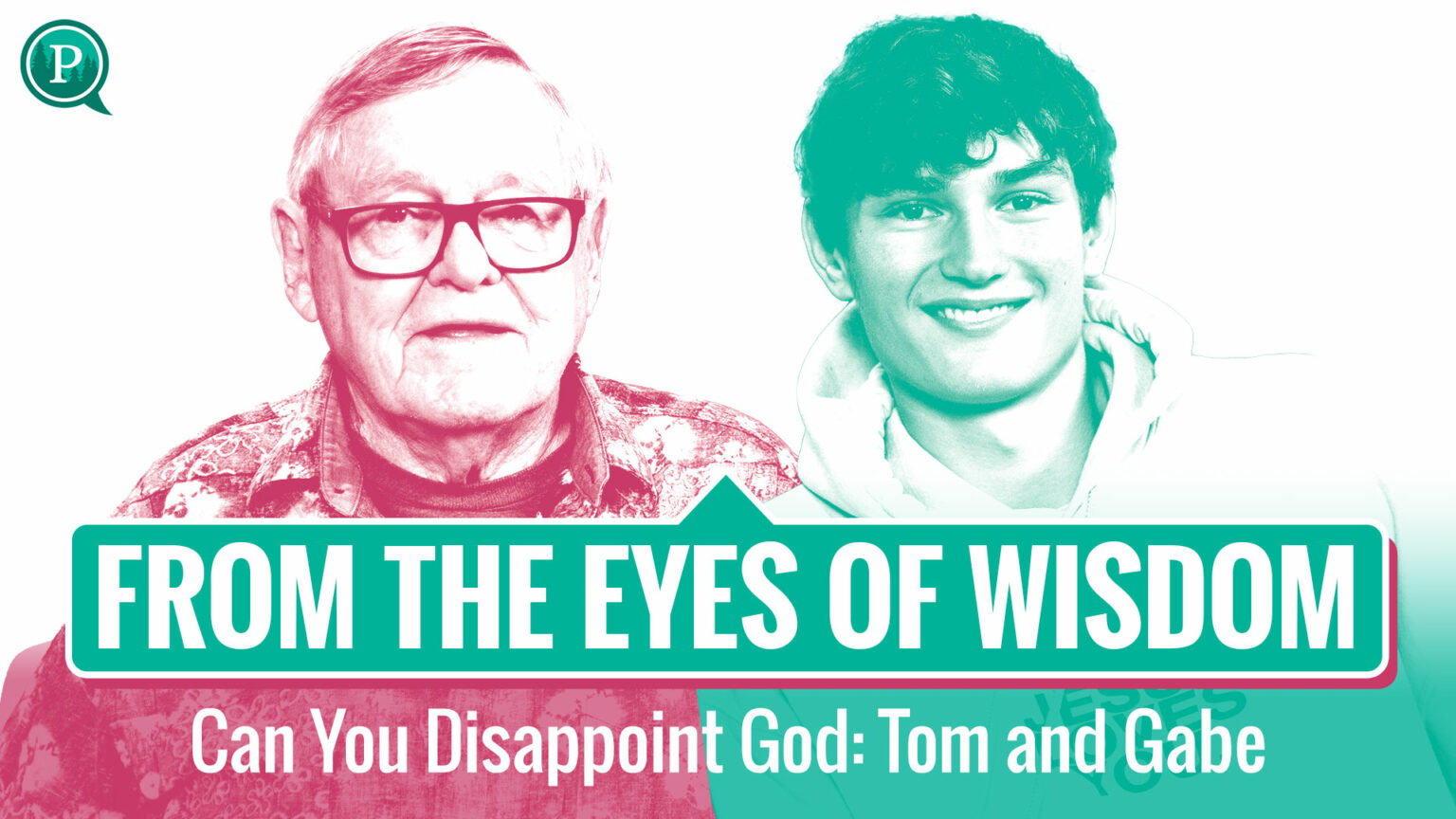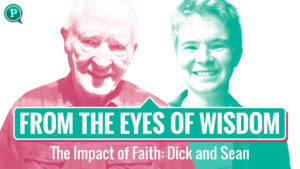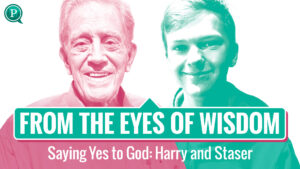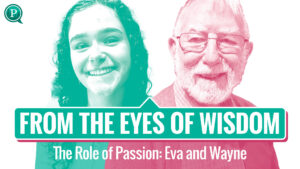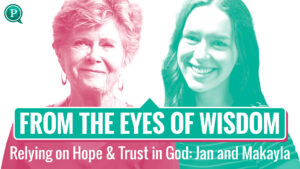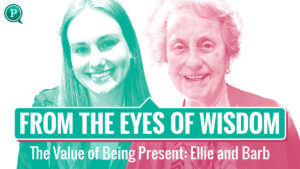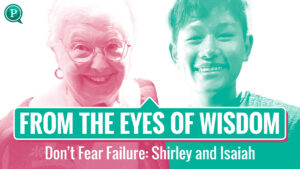We are back for season 3 of From the Eyes of Wisdom and are so excited to learn in this episode from Tom & Gabe. Tom has some powerful wisdom about how to work to live and not live to work. Gabe feels the pressure of living up to that societal pressure and asks “Can you disappoint God?” Don’t miss this enlightening conversation.
Find Out More:
CRISTA Senior Living | King’s Schools | CRISTA Media | CRISTA Ministries
Transcription:
Sherri Lynn:
Have you ever wished you could know what the future held before you got there? What if you were given the gift of knowledge before you even began your journey? Now I’ve been thinking about that because I made a lot of stupid mistakes when I was younger and I wish I had someone to say, “Don’t go down that road. Go down this one.” I’m Sherri. And welcome to From the Eyes of Wisdom where we are pairing an experienced elder from CRISTA Senior living with a passionate King’s High School student ready to launch into the world. And while these conversations won’t tell the future exactly, they did reveal a lot we weren’t expecting about how to live life well. Are you ready? I can’t wait for you to hear this.
Welcome to From The Eyes of Wisdom. I’m your host, Sherri Lynn. And from the top, I need to let you know that this podcast will be an extended podcast. So we plan to have this one for approximately three hours. I’m looking at the clock, three hours and five minutes. And that is because Gabe, who is one of our guests today, needs it to go longer so that he does not have to attend his AP Gov class. Just kidding of course. We’re happy to have Tom here. Tom, thank you for joining us. Tom doesn’t know what’s going on.
Tom:
I don’t know what’s going on.
Sherri Lynn:
Tom’s like, “My goodness, I agreed to this.” And Gabe is here as well. So thank you guys for joining us. We’re just going to talk a little bit about life and wisdom. And Tom, may I ask you how old you are?
Tom:
Yeah, I’ll be 90, the 26th of this month.
Sherri Lynn:
You look fantastic.
Tom:
Thank you.
Sherri Lynn:
All right.
Tom:
I’m really 110.
Sherri Lynn:
Are you really? Okay, so you’ll be 111. You look fantastic. You really do. And Gabe, how old are you, please?
Gabe:
I am 17 right now.
Sherri Lynn:
17.
Tom:
Can’t even vote yet.
Sherri Lynn:
All right. So let me ask you this. Do you have a strong sense or have you ever had a strong sense of what you wanted to “be”?
Gabe:
Oh, absolutely not.
Sherri Lynn:
No, never?
Gabe:
No, no. I mean, career-wise no. I mean, obviously you have the, as you’re getting older, you have the basic things of like, okay, I don’t know if I want to be an astronaut or a firefighter, but I know I want to be a nice person or a good husband. So from that perspective, yeah, I’m pretty certain that I don’t want to be a bad dad, but career-wise, no, I’m not super, super locked in.
Sherri Lynn:
Are you ever, intimidate is not a good word, but it does ever make you feel a little awkward when you hear your classmates or your peers, and they do have a strong sense of it? I want to be a lawyer, period. I want to be an actor, period. I want to be an engineer, period. They’re so sure they’re so solid. Does that make you feel insecure in any way?
Gabe:
I think in the past it has. Yeah. It’s like they know that they want to be writing books and they love books or they love writing stories and that’s what they’re going to do. And they love it right now and we’re 12 and they’re already like, ah, I love writing short stories. I like playing with Legos. So that’s not a great career path. But as I’ve gotten older, no, I don’t, that’s not frustrating to me. I’m just happy that they know. At least they say they know what they want. But I also hear lots of adults go, “Yeah, they don’t know what they want.”
Sherri Lynn:
Okay. Right. Tom, 17, did you have a strong sense of?
Gabe:
No.
Sherri Lynn:
No. You didn’t. No, you can’t.
Tom:
I just wanted to grow up.
Sherri Lynn:
Okay.
Tom:
I still want to grow up.
Sherri Lynn:
You still want to grow up?
Tom:
I’m still working on it.
Sherri Lynn:
You’re getting there. You’re getting there. So 17, take me back to Tom at 17.
Tom:
Yeah, I grew up in a small town at 17, at younger grades than 17 I was a pretty serious person and I still am, I think.
Sherri Lynn:
What does that mean?
Tom:
I’m not, as far as going to school, I wanted to do what’s right and good and I was having trouble spelling and my mother pulled me aside and said, “Tom, don’t worry about it.” Therefore, my grades weren’t anything at all. I didn’t worry about it. I was known as the daydreamer in school. My teachers would say, “Hey, Tom, quit looking out the window.” I just kind of went with life as it was given me, and I just, as a result, I’m pretty laid back. I still am.
Sherri Lynn:
Okay. So you feel like sort of a laid back life. One of the things I loved about listening to your pre-interview and tell me if I got the right impression is it sounded as if work was not your life.
Tom:
Yes.
Sherri Lynn:
And I got this from your pre-interview, Gabe as well, is that you weren’t interested in that kind of life either where your life is work. It sounded as if you had a life and work paid for the life.
Tom:
Yes. I went to college to get a job. I didn’t go to college to get a career or to be an engineer or a doctor. I got a business degree and I just wanted a job. But I was married at that time and we had a child on the way, so I needed a job.
Sherri Lynn:
When did you meet your wife?
Tom:
I met her basically we got married in 1955. So I met her in about ’53.
Sherri Lynn:
Okay. How old were you?
Tom:
I was probably 18, 19, 20, somewhere in there. I was young.
Sherri Lynn:
How did you meet?
Tom:
We met in my small town at a movie theater. My wife was going to college at a town nearby and a girlfriend of hers invited her to spend the weekend in Grundy Center where I grew up. And that’s how they happened to be going to the movie. And there was like three or four girls and I was with two or three guys and we just sat next to another and that was our date. And I sat next to Grace’s friend and my best buddy sat next to Grace. So Grace and my best buddy were a date, and that was a date with her best friend. I was working for the phone company. After high school I worked for the phone company for two years, and then I went in the army and then we got married right before I got out of the army. And then I was going to start college in September.
Sherri Lynn:
You had something to offer.
Tom:
I was hopefully a good prospect for her, but at the time I offered her nothing.
Sherri Lynn:
So Gabe, if I said if the Angel came down here, I’m not going to say Angel Gabriel because that, so if the Angel Michael, we’ll take the other one.
Gabe:
My dad.
Sherri Lynn:
Yeah, sure. Your dad’s name’s Michael? So Angel Michael comes down and he says he gets two options and he says, “Hey, you can get married later in life, so you’re going to get married at 40 and you’re established, or you could get married at 18 or 19 or 20, let’s say 20?”
Gabe:
Twenty’s a lot more reasonable.
Sherri Lynn:
Okay. 19. You’re going to get married at 19 and you got nothing. Here’s your choices. Which one are you taking? Are you taking the 40 or are you taking the 19?
Gabe:
19.
Sherri Lynn:
- That a good choice, Tom?
Tom:
I think so.
Sherri Lynn:
That’s a good choice. Yeah.
Tom:
Yeah, because we grew up together, really.
Sherri Lynn:
Oh, I like that. That’s so sweet.
Tom:
I was providing an income with the GI bill.
Sherri Lynn:
Okay. I like you grew up together. Doesn’t that sound sweet?
Gabe:
That’s what I was going to say is if we had the opportunity to grow up together, then I’d be a little more willing. I am not saying I have to be grown up to get married. I’m just saying that.
Sherri Lynn:
No, I understand what you’re saying.
Gabe:
I don’t want to be a kid.
Sherri Lynn:
And you want to provide, you want to be a provider. I understand that. Growing up together sounds really sweet.
Tom:
Well, she had two years of education to be a teacher. In Iowa you could be a teacher with two years back then. And so she had a job in West Branch, Iowa, which is a very small town near Iowa City where I went to school. And so she had a job. We had a GI bill. I purchased a Volkswagen right out of the army for like $1,500. Because they weren’t popular then. And they were selling, this was a dealer car that had been used by the dealer, but it was like a new car. And so we had everything we wanted.
Sherri Lynn:
Love that. If I had Grace here and I said, Grace, what makes Tom, 68 years, what makes him just the best husband? What would she say?
Tom:
I guess I’m dependable.
Sherri Lynn:
68 years. I bet you are. Yeah.
Tom:
And a provider really. I mean, I’ve worked my whole life. I was good at working, but I didn’t find my part that fired me up and made me a real good worker.
Sherri Lynn:
Okay.
Tom:
I just got by.
Sherri Lynn:
But you provided?
Tom:
Yes, I did.
Sherri Lynn:
Okay. And so she wouldn’t say, well, I wish he would’ve found that thing that was?
Tom:
No, she wasn’t, her ideal or her desires weren’t for wealth and fame, put it that way. But she did end up being the personal secretary to the governor of Iowa.
Sherri Lynn:
Really?
Tom:
Yeah.
Sherri Lynn:
Wow.
Tom:
And they connected a good relationship and he was recently the ambassador to China. He just got back.
Sherri Lynn:
My goodness.
Tom:
He’s involved. He’s still around and he calls her every three months on the phone and they just talk about all the people they’ve known over the years and it’s good.
Sherri Lynn:
That’s amazing. So if you got married at 19, 20 and you could ask Tom a few questions, what would they be?
Tom:
[inaudible 00:10:39]
Gabe:
See you’ve had time to plan. That’s not fair at all. [inaudible 00:10:41].
Sherri Lynn:
Absolutely right.
Tom:
This is where your improv comes in.
Gabe:
If I could ask, you.
Tom:
We’re testing it now.
Sherri Lynn:
Yeah, let’s see.
Gabe:
So I have to put myself into a theoretical situation where I can even trick a girl into marrying me.
Sherri Lynn:
Sure. Yeah, sure.
Gabe:
I know that being married definitely in the long run when it works is worth it. But what specifically to you has made marriage worth it?
Tom:
I just assumed that that was the only way to go, really. And once we got married, I think both of us decided divorce was not an option. I mean, we wouldn’t even go close to it. So we knew we had to fight it out. And of course we did have fights. I mean, we’re humans and we go at one another once in a while, but we learn how to fight good. I mean the right way. Not hold a grudge.
Sherri Lynn:
I was going to ask, I’m guessing after 68 years, you do learn how to fight good. But what is fighting good? How do you do that to keep it going for 68 years?
Tom:
I’m an individual, Grace is an individual. We’re not one, even though we’re married. And so I have points that I don’t want to back down. And she has ones and I think we know each other, how far we can go. And you just work it out, I think. And you learn to be humble and forgive.
Sherri Lynn:
Okay. Be humble.
Tom:
And it’s hard for men to forgive, I feel.
Sherri Lynn:
That’s interesting.
Tom:
I feel it is.
Sherri Lynn:
Have you experienced that? Forgiveness being difficult?
Gabe:
I think forgiving, okay, we’re speaking 17 years experience, so that’s not a super long timeline. And I’ve grown up fairly well, so I don’t have any grudges.
Sherri Lynn:
When you say you grow up, you’ve grew up fairly well. What does that mean?
Gabe:
Well, I’ve had two loving parents. I haven’t had any siblings.
Sherri Lynn:
Oh, not a lot of hardship.
Gabe:
Yeah, not a lot of hardship. It’s been good. So I can’t really speak to, I’m sure it would be harder for me to answer this question if I truly had gone through something that was more of a bigger betrayal.
Sherri Lynn:
Got it.
Gabe:
But in terms of smaller things, I don’t find it hard to forgive. I think if anybody is the hardest person to forgive, it’s myself. I mean I know who I could be and I’m not that guy. And so it’s hard to let myself get off the hook. But in terms of other people, I’m like, well, and again, it’s only been small things like, “Oh man, you didn’t pass me your homework answers. Gosh!” It’s nothing brutal.
Sherri Lynn:
There hasn’t been anything life altering as of yet. Got it. That makes sense. Are you a reader?
Gabe:
I don’t read books, but I listened to lots of podcasts or I’m consuming information. So I think personally it’s just a different medium. But in terms of the type of person that’s a reader, yes. Just I don’t read books themselves.
Sherri Lynn:
I asked that specifically Tom because when I was listening to your pre-interview. It sounds like you are an avid reader or have been avid reader.
Tom:
Yeah, I go on spells, I get a good book and I want to read more and then I get a bad book and I don’t.
Sherri Lynn:
You’re like, “Enough of that.”
Tom:
Right now I’m in a reading mode.
Sherri Lynn:
Okay. Are there books or ideas that have changed your life or changed your thought patterns?
Tom:
I’m sure they have. I’m sure.
Sherri Lynn:
Anything stick out to you?
Tom:
I like new ideas and I like-
Sherri Lynn:
That’s nice. It sounds like you’re saying.
Tom:
I like to learn something new.
Sherri Lynn:
Can you remember something that a new idea that came and you were like, “Huh, I did not, that’s amazing.” And it kind of shifted your thought pattern or even your life?
Tom:
Yeah, I heard a pastor, we have Vespers over at Cristwood and the pastor Neil is his first name and he’s Calvary, I’m not sure what church, but it’s real close here. But we went there Sunday night and he was talking about the humanity or the humanness of Jesus and that he was completely human and growing up, I’ve gone to church ever since I met Grace, really. I mean, I had to go to church. It was expected. I couldn’t just say, “I’m staying home and I don’t want to go.” I felt and I wanted to please her. But anyway, I didn’t buy church until later in life. I mean, Jesus.
Sherri Lynn:
That’s fair.
Tom:
But back to my story is I heard different versions of our humanity being human. And I don’t know if it was Luther or one guy said, being human is bad, you’re a natural person and you got bad desires and stuff. Kind of do away with your humanity and be somebody else. Well, this pastor was saying that Jesus was completely human, so to me it’s good to be human. So that was something new and I’m still working with it and I don’t understand it completely.
Sherri Lynn:
Oh my gosh. I just want to say to you before I go on with it, your humility is really breathtaking to me.
Tom:
Oh, really?
Sherri Lynn:
It really is. You’re 90 years old. I mean, no disrespect to anybody anywhere with all the cameras here. You are a man. Your humility to even allow a new idea and to say, “I’m still working with that”, that is something that I would humbly, hopefully suggest to you to take that in, to be sitting next to a man at 90 that says, “I’m taking in a new idea and I’m wrestling with it.” That’s not normal. It’s just not. People usually have ideas and they hold onto their ideas, and then what they do is they go and get other ideas that reinforce the ideas they have.
What I’m saying is to you, Gabe, is that at this age you are building something and the trajectory of that could go to this where it’s the humility of someone who’s willing to take, or you could build the other thing, which is I have my ideas and then I just hang with the people who have my ideas and then I just build myself up into something and I never allow new things to come in. So I just wanted to say that to you as an aside.
Tom:
Thank you.
Sherri Lynn:
That was great.
Tom:
I really appreciate that because I think humility is Christ-like.
Sherri Lynn:
Talk about humility. If I asked you what humility meant, Gabe, what would you say?
Gabe:
I think people can oftentimes conflate it. Without saying it, they conflate it with weakness, right? You’re humble because you don’t necessarily buy into, you’re a little, you’re hesitant in a way is what people describe it as. But that’s not humility, that’s just not having a spine. To me, what I’ve seen is humility is to be firm in what you know, but be willing to listen to what somebody else has to say and then weigh it because there’s people that would, and I think this also kind of ties to the idea of meekness in the Bible where you’ll hear people be like, “Oh, I am a good person because I don’t hurt people.” That’s kind of a crude example, but that doesn’t make you a good person per se. It’s just that if you’re incapable of doing something, then that doesn’t make you good for not doing it.
And so people claim virtue like, “Oh, I’m not doing all these things.” It’s like, well, you’re not even capable of offering a new thought. You don’t even take your own mind seriously. So how can you claim to be that? So I think humility is having that capability. It could be a math teacher and the math teacher’s really smart, but just because they’re smart, it doesn’t mean that they crush their students when they’re wrong. It means that they’re willing to pay attention to the students and go down to their level. And in that, at times, even the master learns from the student. And so I think that’s what humility is it’s a willingness to enter into anything, be it a relationship or a situation, knowing that you don’t know everything, but still being firm and strong and confident in what you do have.
Sherri Lynn:
Okay, that makes sense to me. It really is what Philippians says about Jesus, “Let this mind be in you, which was also in Christ Jesus, and that He made Himself of no reputation.” So He can. He was in the form of God, right? Found Him, but He made Himself of no reputation. So He could do a lot of things, but He didn’t because He loved us so much. So let’s go right down that faith road and say you’re going to church because Grace is like, “Put this tie on and go to church”. Right?
Tom:
Yes. We did wear ties.
Sherri Lynn:
Yeah, you wore a tie to church, you going to church, Grace is like, Get up now. We’re going to church.” And how many kids do you have?
Tom:
Three.
Sherri Lynn:
Three. Okay. So kids are going to church, Tom’s going to church. When did it become “Okay, now this is my faith”?
Tom:
We got involved in a vineyard church in Iowa, and we were part of the people that started it. We were going to a conference of Leanne Payne in Illinois and Leanne Payne is a woman that’s written a lot of books. A lot of it is sexuality things. Anyway, we were at that conference waiting in line for lunch or whatever, and some guy come up and said, “What church do you go to?” He said, “Where are you from? What church?” And I said, “Right now we’re not going to church. We’re looking for a church.” Our church had a big fight and we kind of left it. And anyway, he said, “You ought to go to the Vineyard Church. There’s a man from Minnesota that’s come down to Des Moines, Iowa to start a Vineyard church.”
And I asked his name and got his number, and I called him and we got right in on the ground floor of him planning a church. And we got quite involved because in the Vineyard they say, you can do it. So we had a small group and we even got pins that said “Pastor” on it, and our pastor friend in Minnesota that tore him up to see our pin. But anyway, they gave authority to the mainly flock to take and pray with people. And that kind of got me involved.
Sherri Lynn:
Okay. And you started then to own your faith?
Tom:
Yes.
Sherri Lynn:
Okay. What about you, Gabe? How would you describe you coming to Faith?
Gabe:
I have grown up in a very Christian environment. My parents helped start my church. So I’ve been at the same church 17 years, almost 18, and gone to Christian school my whole life. I went to Bellevue Christian for elementary school and then for junior high, swapped over to here. So obviously you hear a lot when you grow up in that environment, you’re told all the time, “Hey, guess what? Jesus loves you. Wow!”
And then pretty quickly that statement loses all of its meaning. It’s like, “Oh, there’s grace for you.” And you go, “Great.” Growing up in the Christian environment just can lead to emptiness of the words because it’s always like when I hear people want to be like, “Man, when I heard Jesus loves me for the first time and it broke me.” And I’m like, “Wow, that is not how I react to that.” So yeah, I’ve grown up in that environment, but I would say it’s only been over the last two years that it started to hit me from a new angle over COVID, I was early high school, junior high. And I didn’t mean growing up in the, I didn’t care. I always wanted to be a good person, but my metric of a good person was, well, at least I’m not them. So I guess that’s better than not caring at all. But it’s pretty empty. And I remember personally the thing that was the most surprising to me as I was starting to get into that and getting into people trying to dig for truth, not in a Christian context.
Sherri Lynn:
People trying or you were trying?
Gabe:
People trying. I mean me, as a result of watching that, listening, all that being an observer. As I’m going through that anytime that somebody would say something or unearth something and you’d hear it or I’d hear it and it would hit me and I’d be like, “Whoa, that’s true. I can’t say that’s not true.” But then what I would realize is since I’ve grown up in this Christian environment, I’m like, oh, that’s what they’re talking about. And so what was really surprising to me is that hearing all of these ideas that in the moment we’re like, “That’s revolutionary.” It’s like, no, it’s not. If you had actually been paying attention, if you had actually had ears to hear, you would’ve figured that out a long time ago. And so these things started to click into place.
Sherri Lynn:
That makes sense.
Gabe:
Early high school and then middle of high school, I still sophomore year, I mean I was more keen to it. I wasn’t super, super into the deep end of faith and I’m still wading out to that I guess. But I remember thinking, oh gosh, I don’t know if I want to say I’m a Christian or whatever. That’s a big thing and I don’t know if I can live up to that. And I remember, I think I was at a summer camp and things have been starting to make sense and there’s a lot of outside stuff that life entails in life. And so I’m processing all this stuff. I’m getting older. I’m halfway through high school now. I’m looking towards the second half of high school. And then now things are becoming a little more real like, okay, college is a lot closer than you think it is, and the rest of your life is ahead of you.
And I remember thinking, man, I’m just not ready for this at all. And I went to a youth camp and I kind of started to realize I don’t think I’m ever going to be ready. So either I make this choice now and go with it, or I just always stand on the sidelines and I’m going to regret it someday.
Sherri Lynn:
And that choice is?
Gabe:
Faith.
Sherri Lynn:
Faith saying I-
Gabe:
Faith, and then more specifically being willing to make a public declaration in baptism. So I got baptized, what was I, 16? In a lake, my best friend and I got baptized together. So that was kind of a small piece of my journey to faith. I think as I look at early, early high school, I think what a lot of how I was is that I was more so running away from hell than I was chasing heaven.
Sherri Lynn:
Well, I can say that as a person who was also born into, I always say I was born on a pew as a person that grew up that way. I think that that makes a lot of sense. That’s sort of the way that life is kind of structured, and I don’t think that’s not to disparage our parents or that’s just the kind of way it goes.
Gabe:
Yeah, I’m grateful for what they gave me, but it just made it difficult.
Sherri Lynn:
It’s a foundation and it leads you to somewhere, but that’s usually how it is. Can you resonate with anything that you heard there, Tom, about that kind of apprehension, that kind of journeying to the truth in your own life, even though you came a little later?
Tom:
I’m still journeying.
Sherri Lynn:
You’re still journeying.
Gabe:
Still wading out to that deep end.
Sherri Lynn:
I love that. I don’t think there’s any, I mean, Paul said, “I count myself not to have apprehended.” So if he hasn’t apprehended, who are we to be like, “I got it. I got it all.” You know what I mean? Peter who walked with Jesus said-
Tom:
Yeah, I know. Keep questioning that.
Sherri Lynn:
Yeah. He’s like, “Hey, Paul says a lot of stuff, and I don’t know what he’s talking about half the time.” He said that, right? So for us to read it and be like, “No, I know exactly what Paul’s talking about.” That doesn’t make any sense. So I think to say you are still journeying makes, I think that’s wisdom.
Tom:
And I think doubting is allowable as a Christian. Some Christians, in fact, my sweet wife, Grace.
Sherri Lynn:
Grace watching?
Tom:
I don’t know. But anyway, a recent example is we are to follow our government. And Jesus went under Caesar’s control.
Sherri Lynn:
Yes, he did.
Tom:
And I said to my sweet wife, I said, “What about if we were living in Nazi, Germany? And the pastor said, ‘We have to follow our leader Hitler’.” And then I would say, “I don’t think so.” So I’d not be a good Christian.
Sherri Lynn:
So you know what? That’s something to wrestle with.
Tom:
My wife didn’t even want to go there.
Sherri Lynn:
She doesn’t want to go there. You want to go to Bonhoeffer way.
Gabe:
Yeah. I wish I was there. I would’ve told you something, but oh, well.
Sherri Lynn:
Well, that’s really good. But those are things that I think sometimes Christians are afraid to wrestle with.
Tom:
Well, it’s not.
Sherri Lynn:
No, it’s not. Don’t you think that’s okay?
Tom:
Yeah. That’s why I’m challenged by it.
Sherri Lynn:
Yeah. I love that you’re challenged. Gabe, let me ask you something. What is your biggest fear?
Gabe:
A verse in the Bible that goes, “To he who much is given, much is expected.” And as I look in my present and in my past and I go, man, I’ve been given so much. It’s not that I just have been given stuff like, oh, I live in America. I’ve grown up in a fairly wealthy family. I’m able to go to a private school. That’s not it, right? It’s also okay, there’s a lot of people that are in that same socioeconomic status, but they didn’t get to go to a Christian school or whatever.
Or they haven’t had world-class teachers that not only care about your studies, but care about you on a level where they’d be willing to talk to you about anything. So I’ve been given so much, and not only externally, but internally, I have a lot of gifts. I don’t know how to apply those per se, but I know that I have a lot. And so as I look at my present and my past, when I look towards my future, it’s like, okay, I’ve been given a lot of tools to go reap. And if I don’t, that would be a shame.
Sherri Lynn:
Why does that make you fearful? What do you think? What do you think will happen? You get out there, you reap absolutely nothing. You come back and that basket is empty, ain’t a thing in it. What do you think? What’s the fear?
Gabe:
There would be two reasons. The first is it’s a really, really hard balance as a Christian to figure out, okay, how much of my relationship with God should consist of faith and how much of it should consist of works? Because a balance, you can have faith and not do anything.
Sherri Lynn:
So are you afraid of disappointing God or are you afraid of, is that it?
Gabe:
I think that could be it. And I think that from what I’ve observed, that idea is one that’s avoided, right? This idea of like, well, you can’t disappoint God. And I go, I don’t know. I think you can because there’s the parable of the guy that gave each of his servants a certain amount of money and one of them just didn’t invest it, hit it. One of them invested a little bit, another one invested it more. And God was like, “Hey, great job you who invested a lot”, and the guy that didn’t do anything with it.
Sherri Lynn:
Okay. So that’s fair to say. God looks and is like, “All right, you know what? Loser.”
Gabe:
Yeah, he’s not necessarily mean, but that doesn’t mean he is a pushover. And so, yeah, I recognize that God’s gracious, but if you don’t respond to him, there’s kind of this idea in the church that God’s always going to stick with you. And I think that’s true, he’ll never forsake you if you don’t forsake him. But I think that people can turn away, can decide to let go. And it’s kind of sobering once you sit there with the fact that you realize that he will respect your no.
Sherri Lynn:
That he what?
Gabe:
Respects your no.
Sherri Lynn:
He respects your no.
Gabe:
Yeah.
Sherri Lynn:
So I have all these talents. I enter adult life. I don’t produce what I think I should have produced? Or what he said I should have produced? And so therefore I probably said no to him. And so the fear is that I’ve disappointed him?
Gabe:
Yeah.
Sherri Lynn:
Okay. Tom, anything about that? What do you think about that fear living here 90, 68 years of marriage, living a full life, thoughts?
Tom:
I guess I feel God’s big enough to take my failures or my disappointments and still love me. In other words, I think everybody disappoints God really. I don’t think Gabe should feel that guilt.
Sherri Lynn:
You can talk to him. You don’t have to talk to me through Gabe.
Tom:
I could have been a better employee if I would’ve found a job that I had passion about. So therefore, and we are to be good to our master, our job, so I failed. Failed. But I think we’re all failures and sinners. Nobody has got it all figured out. I guess I give more grace to God and I don’t feel bad because I’m doing the best I can.
Sherri Lynn:
What’s your biggest fear right now?
Tom:
I don’t know. I am always amazed. Maybe I’m just in a tunnel or something, because I heard once that average American fear is pretty high, and it’s about different things.
Sherri Lynn:
That’s true. Fear, anxiety. Yes. Very high in our culture. Very, very high. It’s such an affluent culture. It has so much.
Tom:
It goes with my taking life easy and just going along with the flow. I don’t really have many fears.
Sherri Lynn:
I’m going to ask you this. I hope it’s not offensive. Do you fear death?
Tom:
No.
Sherri Lynn:
You don’t?
Tom:
I don’t. I mean, I don’t want it. But so far-
Sherri Lynn:
You’re not welcoming it.
Tom:
As to why, I don’t know. I’ve never had that problem. And as I get more faith, reading the Bible and stuff was what I’m doing now. It doesn’t change my view of death. I mean, I guess I’ve always been assured that everything’s going to be all right, which is not right.
Sherri Lynn:
But it has been. You feel like it has been for life, right?
Tom:
Well, I’ve had some hits, but not big ones.
Sherri Lynn:
You’re still sitting here.
Tom:
Yeah, I’m still here. Yeah.
Sherri Lynn:
Right. Okay. Then it’s been okay. I could sit and talk to you guys forever, but we got to wrap up. I’m going to ask you, Tom, right now for Gabe, he’s going to go to college. He’s going to marry his wife at 19. They’re going to be married 72 years and all of that. If you had one piece of advice you could give him for life.
Tom:
Oh boy.
Sherri Lynn:
He’s going to write it down. That’s what this is for. He’s going to write it down. He’s going to take it with him.
Tom:
As I’ve gotten older, and this didn’t happen probably until 10 years ago, I’ve gotten more confidence in myself. As a younger person I lacked self-confidence. But as of 10 years ago, I’ve gotten into woodworking and this sort of thing. I’ve also become a fix-it guy. If something’s broken, a car, a stove, I’ll go to YouTube and I’ll read it and I can fix it. So I’ve developed the attitude that I can do anything.
Sherri Lynn:
Wow.
Tom:
Really. And that’s my point. If you don’t feel you can do it like going to college or pleasing God, you’ll never do it. But if you say you can, you beat it. And you might not do it right away. And I never can fix things or solve problems right away, but I keep at it like a bulldog until I do it.
Sherri Lynn:
Keep at it.
Tom:
Yeah. Confidence that you can do it.
Sherri Lynn:
Confidence that you can do it. I love that. You guys have been a delight. I tried to keep it a little longer, but I couldn’t. Can’t go to 3:05.
Tom:
Has to go to class.
Sherri Lynn:
Gabe’s got to go to class guys.
Tom:
Well, you could call in sick.
Sherri Lynn:
We’ll have Tom call him in sick. Thank you all for joining us. This has been From the Eyes of Wisdom, and we’ll see you next time.
Follow this podcast:

